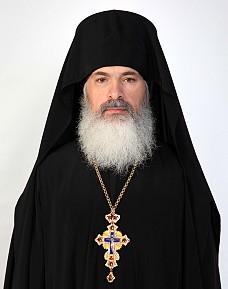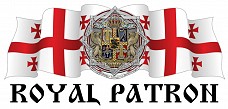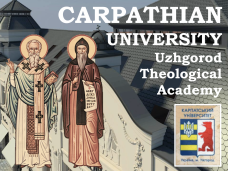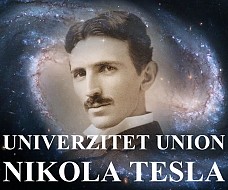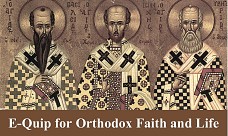Καὶ μὴ συσχηματίζεσθε τῷ αἰῶνι τούτῳ, ἀλλὰ μεταμορφοῦσθε τῇ ἀνακαινώσει τοῦ νοός ὑμῶν, εἰς τὸ δοκιμάζειν ὑμᾶς τί τὸ θέλημα τοῦ Θεοῦ τὸ ἀγαθὸν καὶ εὐάρεστον καὶ τέλειον (Προς Ρωμαίους ιβ ́ 2). Do not allow this world to mold you in its own image. Instead, be transformed from the inside out by renewing your mind. As a result, you will be able to discern what God wills and whatever God finds good, pleasing, and complete (Romans 12:2, Voice).
St. Gregory Nazianzen Institute
St. Gregory Nazianzen Institute is an ecclesiastical institution of higher learning, and an integrated auxiliary [and educational ministry] of St. Spyridon Russian Orthodox Church in Union with Old Rome. As an ecclesiastical institution of higher learning, the Institute provides distance learning opportunities through free, accessible, flexible, and high-quality certificate, diploma, undergraduate, graduate, and postgraduate programs in the various domains of the ecclesiastical sciences, and more specifically in Eastern Christian Studies (ECS). St. Gregory Nazianzen is a virtual space of community, encounter, reflection, inspiration, integration, and personal growth.
Why study at St. Gregory Nazianzen Institute?
St. Gregory Nazianzen Institute utilizes an ‘individualized distance-learning delivery model,’ which combines personal choice, quality, convenience, and flexibility. This model includes:
The goal of the Institute’s learner-centered model is to facilitate the student’s pursuit of academic excellence, and moreover, to foment the acquisition of critical thinking, emotional literacy, social intelligence, and other 'hard/soft' skills, [e.g., attention, communication skills, conflict resolution, flexibility, focus, independence, integrity, leadership, motivation, multitasking, organizational skills, patience, self-direction, self-discipline, situational awareness, sound judgment, teamwork, time-management, and tolerance].
Ultimately, the Institute’s innovative distance learning programs provide study tracks [and spiritual growth pathways] that fit the adult learner’s individual needs, schedule, and learning style, making it possible for the student to manage a family, job, career, and/or other responsibilities while studying.
Eastern Christian Studies
ECS programs are subject to a bilateral ‘validation partnership’ with Carpathian University (UA), and have been certified to prepare candidates for ordination [by multiple ecclesiastical jurisdictions]. ECS programs of study focus on the creation of a learning and research environment that fosters growth in knowledge, faith, spiritual life and experience, leadership in apostolia [or outreach and mission], and diakonia [or sacrificial service] to the Universal Church through a rigorous personal training [and coaching] regimen of human, spiritual, liturgical, intellectual, and pastoral formation. ECS Students and alumni now serve the Church in ecclesiastical jurisdictions across the world. The certificate, diploma, and degree offerings include:
Specialization tracks [majors] for ECS programs include:
Secondary Majors
A wide range of secondary major options are available at the Institute through the bilateral ‘validation partnership’ with Carpathian University (UA), which is a fully accredited institution of higher learning in the Ukraine. Secondary majors supplement and strengthen the ECS programs and specialization tracks and assist in the development of a full range of integrative skills in the areas of critical thinking and inquiry, creative synthesis, conceptual blending, dialogue, and multicultural/transcultural thinking. The intention is to foster a creative and transformative paradigm in which movement across the regulated perspectives and methodologies of disciplinary thought and learning can be achieved, and ultimately employed to span the divides between cultures, languages, philosophies, worldviews, and lifeworlds. The dynamic goal-orientation is the formation of servant-leaders who are equipped to ‘break down the middle wall of enmity’ [Ephesians 2:14], and to move across seemingly insurmountable chasms in an effort to ‘bridge and build’ for the Kingdom of God.
Secular Degree Programs
Secular degree programs are available through the Institute's academic partner, Nikola Tesla Union University (NTU), which is an institution of higher learning accredited by the Republic of Serbia (RS) [see Spisak Akreditovanih Fakulteta i Univerziteta — List of Accredited Universities in Serbia]. For information regarding the program offerings through NTU, see Nikola Tesla Union University Programs of Study or A Guide through Accredited Institutions of Higher Education and Study Programs in Serbia, (pp. 59–61). Applications for these certificate, diploma, and degree programs at NTU should be directed to NTU admissions.
St. Gregory Nazianzen K-12 Academy
St. Gregory Nazianzen K-12 Academy — an auxiliary of St. Spyridon Russian Orthodox Church in Union with Old Rome — offers a structured distance-learning environment for grades K-12 through Liberty University Online Academy (LUOA). The St. Gregory Nazianzen K-12 Academy curriculum is mapped, provided, taught, supervised, graded and otherwise evaluated by Liberty University [see Liberty University Online Academy Inquiry Booklet and enroll NOW!].
|
EASTERN CHRISTIANITY
Eastern Christianity comprises the Christian churches and traditions that emerged in the Middle East, Asia Minor, the Balkans, the Horn of Africa, and southern India over the course of several centuries of religious antiquity. The term 'Eastern Christianity' is used to describe all of the Christian traditions that did not develop in Western Europe, and does not describe any single 'Eastern' communion or religious tradition. The dominant Eastern Church today is known as the ‘Eastern Orthodox Church,' and the term ‘Orthodox’ is often used in a very loose fashion as ‘Eastern.’ Notwithstanding, and more accurately, all Eastern Churches consider themselves part of an Orthodox and/or Catholic communion. Eastern Christians do not necessarily have shared religious practices but many Eastern Christian communities have shared cultural traditions.
The terms ‘Eastern’ and ‘Western’ originated with divisions in the Church that mirrored the cultural and linguistic divides between the Hellenistic East and Latinate West and the political divide between the Western Roman and Eastern Roman Empires. Divisions among Eastern Christians often reflected the cultural, linguistic, political, and ongoing power struggles between the different ethnicities within the Eastern Roman Empire.
In spite of these divisions, the Church was originally established in the East on the principle of unity, [i.e. catholicity and/or ecumenicity]. This is in contrast to the models that then existed in paganism, Judaism, and other ancient belief-systems. For the earliest Christian communities, the concept of Catholic unity was manifested through a confessional understanding of Christianity based upon tradition, which was established on the teachings of Christ and the Apostles. Tradition was therefore the 'unifying doctrine,' which mystically established a setting that fostered the creation in each individual believer of a personal relationship with God in Christ. Departures from that ‘unifying doctrine’, which disturbed the creation of this salvific relationship, were condemned.
As reputed ‘departures’ or ‘innovations’ surfaced, and/or differences in understanding, interpretation, and/or practice of tradition between the many ancient communities appeared, [which invariably paralleled the existing cultural, linguistic, and political divides], the Church as a united community attempted, [often inadequately], to address, confirm, and/or deny the same. Tradition was the cornerstone to how teachings and practices were deemed to be valid since tradition itself cultivated a relationship with the living God. Subsequently, the Ecumenical and other Councils of the Church attempted not only to define Christianity but also to determine who was a Christian.
Today there are four main branches or families of Eastern Christianity — each of which has a distinct understanding, interpretation, and/or practice of tradition:
(1) The Eastern Orthodox Church (2) The Oriental Orthodox Churches (3) The Nestorian Church of the East (4) The Eastern Orthodox Churches in Union with Rome
Eastern Christians comprise approximately one fifth of the total number of Christians worldwide. Their experience is vital to a comprehensive knowledge and understanding of the Christian message and Christianity. Their survival in the most hostile of environments may be the key to the survival of the Church in an increasingly secular world. |
Copyright 2009–2024 St. Gregory Nazianzen Institute


